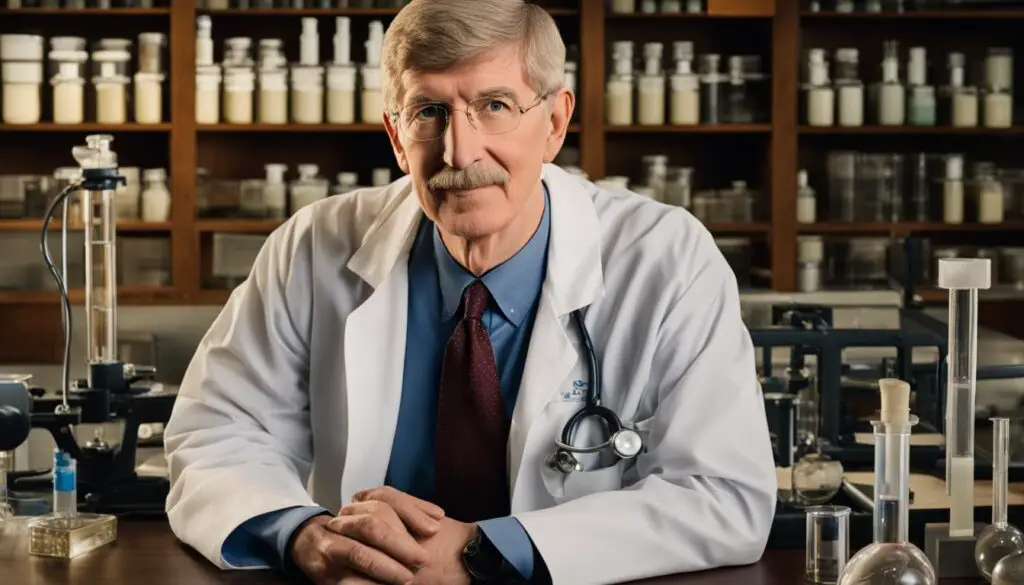Dr. Francis S. Collins, the director of the National Institutes of Health (NIH), is a distinguished geneticist and physician who has made significant contributions in the field of genome research. With a keen interest in personal genomics and precision medicine, Dr. Collins has propelled the advancements of health science and biomedical research. His extensive experience and expertise in bioinformatics have transformed the way we understand and apply genomics in healthcare.
What sets Dr. Collins apart is his exceptional ability to bridge the gap between science and faith. Despite the perceived conflict between the two, Dr. Collins firmly believes that they can coexist harmoniously. His personal journey from atheism to Christianity has profoundly influenced his approach to scientific inquiry, inspiring him to explore the moral and existential questions that arise from scientific discoveries.
When faced with challenges, Dr. Collins has shown remarkable resilience and determination. Leading the groundbreaking Human Genome Project as the director of the National Human Genome Research Institute, he demonstrated the power of scientific collaboration. His leadership and visionary guidance resulted in the successful sequencing of the human genome ahead of schedule and under budget, laying the foundation for groundbreaking genetic discoveries.
Dr. Collins has also faced opposition from those who disagreed with his views on religion. However, his unwavering commitment to both science and faith, coupled with his stellar achievements in genetic research, garnered bipartisan support and the trust of elected officials, allowing him to continue making significant contributions to the field.
The impact of Dr. Collins’ work extends far beyond the scientific community. His advocacy for the compatibility of science and religion has inspired countless individuals to explore the intersections of faith and scientific discovery. Through his organization, BioLogos, Dr. Collins promotes open dialogue and the mutual enrichment of science and faith, fostering a more nuanced understanding of the world.
Key Takeaways:
- Dr. Francis S. Collins is a renowned geneticist and physician.
- His groundbreaking work in genome research has advanced health science.
- Dr. Collins believes that science and faith can coexist and bring a deeper understanding of morality and existence.
- He led the Human Genome Project, resulting in groundbreaking genetic discoveries.
- Despite opposition, Dr. Collins has earned bipartisan support and the trust of elected officials.
Early Life and Faith Journey
Dr. Francis S. Collins, the renowned geneticist and director of the National Institutes of Health (NIH), had a journey that shaped his unique perspective on the intersection of science and faith. Growing up on a farm in Virginia’s Shenandoah Valley, Collins was raised in a family with no strong religious affiliations. However, it was through his exposure to music and witnessing patients finding solace in their faith that he began to ponder the connection between science and religion.
As a medical student, Dr. Collins started questioning his atheistic beliefs, yearning to understand the role of faith in comprehending the universe and the complexities of human life. This quest led him on a personal exploration, ultimately leading him to embrace Christianity as a harmonious companion to scientific investigation.

This image depicts the groundbreaking genome research conducted by Dr. Francis S. Collins and his team. His early life and faith journey influenced his views on science and religion, leading him to discover new insights in the field of genomics.
The Human Genome Project
Under the leadership of Dr. Francis S. Collins, the National Human Genome Research Institute spearheaded one of the most groundbreaking scientific endeavors in history – the Human Genome Project. This ambitious project aimed to sequence the entire human genome, unlocking the mysteries held within our DNA and paving the way for revolutionary genetic discoveries.
Collins’ visionary approach and unwavering commitment to scientific collaboration were pivotal in the success of the Human Genome Project. With an unprecedented level of cooperation among scientists from around the world, the project achieved its goal ahead of schedule, highlighting the power of international scientific collaboration.

The completion of the Human Genome Project had far-reaching implications for the field of genomics. It provided scientists with a comprehensive blueprint of the human genome, shedding light on the complex mechanisms underlying human biology and disease. This foundational knowledge opened up new avenues for research, leading to breakthroughs in personalized medicine, genetic diagnostics, and the development of innovative therapies.
Through his leadership, Dr. Collins solidified his reputation as a pioneering figure in genome research. His dedication to advancing scientific knowledge and his ability to foster collaboration among diverse teams of researchers have left an indelible impact on the scientific community and society as a whole.
To illustrate the immense scope of the Human Genome Project’s achievements, the following table showcases key milestones and discoveries:
| Year | Key Milestone/Discovery |
|---|---|
| 2000 | Publication of the first draft of the human genome sequence |
| 2001 | Complete sequencing of the entire human genome |
| 2003 | Completion of the Human Genome Project, two years ahead of schedule |
| 2012 | Discovery of critical regions associated with various diseases |
| 2015 | Identification of genetic links to complex traits and susceptibility to diseases |
| 2020 | Advancements in gene editing technologies, such as CRISPR-Cas9 |
Overcoming Opposition
When Dr. Francis S. Collins was nominated to lead the National Institutes of Health (NIH) by President Barack Obama, he faced opposition from some members of the scientific community who disagreed with his views on religion. However, despite the criticism and challenges, Collins remained steadfast in his commitment to bridge the gap between science and religion.
As a respected geneticist known for his groundbreaking discoveries, Collins had amassed a wealth of knowledge and expertise in the field. His accomplishments in genetic research and his ability to embrace both faith and science played a significant role in overcoming the opposition he faced.
With unwavering determination, Collins’s relentless pursuit of scientific advancements earned him the trust and support of elected officials from both sides of the political spectrum. Despite the initial skepticism, his commitment to scientific excellence and his ability to harmonize science and religion propelled him forward.
“It is essential to not only embrace the wonders of science but also acknowledge the profound mysteries that lie beyond our comprehension. The pursuit of knowledge should not be hindered but rather enhanced by one’s faith.”
Collins’s strong belief in the coexistence of science and religion served as the guiding principle that enabled him to navigate the obstacles he encountered. Through his unwavering commitment to his core values, he emerged as a leader who could bridge the gap between two seemingly opposing forces.

In the face of opposition, Dr. Collins’s ability to overcome challenges showcased his resilience and determination. His legacy serves as an inspiration not only for scientists but also for individuals who strive to find common ground and foster greater understanding between seemingly conflicting ideologies.
Leadership at the NIH
As the director of the National Institutes of Health (NIH), Dr. Francis S. Collins demonstrated exceptional leadership in the field of biomedical research. Under his guidance, the NIH witnessed significant advancements and played a crucial role in addressing pressing health challenges, including the ongoing COVID-19 pandemic.
Dr. Collins’s commitment to advancing biomedical research was evident in his successful efforts to secure budget increases for the NIH. These budget increases allowed the NIH to fund innovative programs and initiatives across various fields of health science, paving the way for groundbreaking discoveries and advancements in medical treatments.
During the COVID-19 pandemic, Dr. Collins played a pivotal role in leading the NIH’s response to the global crisis. He spearheaded efforts to develop therapies and vaccines, rallying a diverse scientific community to collaborate and accelerate the search for solutions. Through his strategic leadership and commitment to public health, Dr. Collins contributed significantly to the fight against COVID-19.
Dr. Collins’s expertise and vision have had a profound impact on the field of biomedical research. His leadership at the NIH not only propelled scientific advancements but also fostered a culture of collaboration and innovation. Through his initiatives, Dr. Collins has encouraged scientists to explore new frontiers and pushed boundaries in the pursuit of knowledge.

| Key Achievements | Impact on Society |
|---|---|
| Secured budget increases for the NIH | Promoted groundbreaking biomedical research |
| Led efforts to develop therapies and vaccines for COVID-19 | Contributed to the global fight against the pandemic |
| Fostered collaboration and innovation in the scientific community | Advanced the understanding of various diseases and conditions |
The Role of Faith in Science
Dr. Francis S. Collins, a prominent geneticist and physician, has been a staunch advocate for the compatibility of science and religion. He firmly believes that faith can provide a richer understanding of the moral and ethical implications that arise from scientific discoveries. Dr. Collins’s commitment to bridging the gap between science and faith led him to establish BioLogos, an organization that promotes the harmony between these two seemingly disparate realms.

Through his books and lectures, Dr. Collins presents evidence supporting the rationality of faith and underscores the importance of considering both scientific and spiritual perspectives when addressing complex issues. He demonstrates that faith and scientific inquiry can serve as mutually reinforcing forces, encouraging a deeper exploration of the natural world while embracing the profound questions that arise from our existence.
The Trust of Elected Officials
Dr. Francis S. Collins, with his unwavering integrity and expertise, has garnered the trust and respect of elected officials across the political spectrum. He adeptly navigates the often-polarized world of politics, maintaining bipartisan support for his groundbreaking work in scientific research and leadership.
In times of political transition, such as with the change in administration, Dr. Collins has been called upon to continue his vital role in leading the National Institutes of Health (NIH). This demonstrates the trust placed in him by elected officials who recognize his invaluable contributions to the field of biomedical research.
Dr. Collins’ reputation as a trusted and influential scientist enables him to bridge divides and advocate for the importance of scientific research, even in times of political and ideological differences. His ability to garner support from elected officials showcases his ability to transcend partisan lines and work towards a common goal: advancing scientific knowledge for the betterment of society.
By earning bipartisan support, Dr. Collins exemplifies not only his own leadership capabilities but also the respect he garners within the scientific and political communities alike. His ability to navigate these interconnected realms with grace and diplomacy serves as an inspiration for future generations of scientists.
| Key Achievements | Impact on Society |
|---|---|
| Leading the Human Genome Project | Revolutionizing genetics research and paving the way for groundbreaking discoveries and advancements in precision medicine. |
| Earned bipartisan support as the director of the NIH | Showcasing the trust and recognition of elected officials from both sides of the political spectrum. |
| Founding BioLogos | Promoting the harmony between science and faith, fostering a greater understanding of the compatibility between the two. |
Challenges in the Era of Polarization
Dr. Francis S. Collins understands the challenges that the scientific community faces in an era of deep polarization. Despite significant advancements in science, trust in its findings has been eroded by misinformation and the influence of political ideologies. Dr. Collins recognizes the urgent need to rebuild trust and bridge the gap between scientific knowledge and public perception.
In order to address these challenges, Dr. Collins advocates for open dialogue and evidence-based communication. He firmly believes that fostering understanding requires engaging with the public, addressing their concerns, and providing transparent information about scientific research. By involving trusted voices, such as religious leaders, in discussions about scientific advancements, Dr. Collins aims to bridge the divide and enhance public perception of the value of scientific inquiry.
Public trust in science is vital for the progress of society. Without it, the impact and potential benefits of scientific discoveries may be undermined. Dr. Collins emphasizes the importance of reaffirming trust in science by promoting accurate information and debunking misinformation. By actively addressing public concerns and engaging in honest conversations, Dr. Collins aims to restore confidence in scientific research and its role in shaping a better future.
“We must strive to communicate the importance of science in a way that resonates with people from all walks of life, regardless of their beliefs or affiliations. Through respectful dialogue and evidence-based communication, we can foster trust and bridge the polarization that threatens our collective progress.”
While the challenges are immense, Dr. Collins remains hopeful that by nurturing an environment of trust and open discourse, the scientific community can regain public confidence. By emphasizing the value and benefits of scientific inquiry in addressing societal issues, Dr. Collins aims to inspire individuals to overcome polarization and embrace the transformative power of science.
Public Perception and Trust in Science: A Comparative Analysis
| Challenges | Dr. Francis S. Collins’ Approach | Outcome |
|---|---|---|
| Misinformation | Evidence-based communication and transparent information | Improved public understanding of scientific research |
| Political ideologies | Involvement of trusted voices, including religious leaders | Bridging the divide between science and belief systems |
| Restoring trust | Open dialogue and addressing public concerns | Greater confidence in scientific advancements |
In a time of polarization, Dr. Collins’ steadfast commitment to rebuilding trust in science serves as an inspiration to both the scientific community and the public at large. His unwavering belief in evidence-based research and his dedication to fostering understanding highlight the importance of collaboration and open-mindedness in addressing societal challenges. By embracing Dr. Collins’ approach, we can collectively overcome polarization and strengthen the bond between scientific knowledge and public perception.
The Continuing Role of Faith Communities
Dr. Francis S. Collins emphasizes the critical role that faith communities play in addressing the ongoing COVID-19 pandemic. As churches and other faith-based organizations have deep connections within their communities, they have a unique opportunity to combat vaccine hesitancy and misinformation.
Religious leaders, like Dr. Collins, can provide trusted guidance and promote accurate information about the vaccines, encouraging their congregations to take necessary precautions. By leveraging their influence and platforms, they can help dispel myths and ensure that accurate information reaches those who need it most.
In addition to combating misinformation, faith communities also have a crucial role in offering support and comfort to those affected by the pandemic. The spiritual and emotional guidance provided by religious leaders creates a sense of unity and resilience in the face of adversity.
By coming together, faith communities can foster an environment of trust and solidarity, where individuals feel supported and empowered to make informed decisions regarding their health and well-being.
Through their actions and outreach, faith communities can make a significant impact in overcoming the challenges posed by the pandemic. Their involvement in vaccination efforts and promotion of accurate information can help save lives and protect communities.
Dr. Collins’s belief in the power of faith communities stems from his understanding of the transformative role they can play in times of crisis. As a renowned scientist and advocate for the harmony between science and religion, he recognizes the importance of collective action in the face of adversity.
It is through the combined efforts of individuals, communities, and faith-based organizations that we can overcome challenges and emerge stronger together.
Persistence in Doing Good
Dr. Francis S. Collins acknowledges the fatigue and weariness experienced by individuals who have been tirelessly involved in the battle against the ongoing challenges of the pandemic. However, he believes in the power of resilience and encourages Christians to persist in doing good, drawing inspiration from their faith and the belief that their efforts are part of a divine plan.
Amidst ongoing challenges, Dr. Collins emphasizes the importance of compassion and resilience. He urges individuals to reach out to those still in need, offering support, and solidarity. Taking necessary measures to protect vulnerable populations remains paramount, and Collins reminds everyone to adhere to these measures with renewed dedication and strength.
While recognizing the need for breaks and self-care, Dr. Collins encourages individuals to return to the cause, serving others with unwavering determination. He believes that acts of compassion and resilience can make a significant difference in navigating the ongoing challenges we face as a society.
Conclusion
Dr. Francis S. Collins, the pioneering geneticist, physician, and advocate for the intersection of science and faith, leaves behind a remarkable legacy. His groundbreaking contributions to genome research, visionary leadership at the National Institutes of Health (NIH), and unwavering commitment to bridge scientific and religious divides have had a profound impact on the field of biomedicine.
What inspired Dr. Collins’ work was his unique ability to harmonize scientific discovery with his deep personal faith. He demonstrated that the pursuit of knowledge and the exploration of the mysteries of the universe can coexist with spiritual beliefs, creating a space where science and faith complement and enhance each other.
Overcoming challenges, Dr. Collins faced opposition for his views on religion, but his unwavering resolve and steadfast dedication to the betterment of society earned him the trust and support of elected officials from both sides of the political spectrum. His ability to navigate the often-polarized world of politics speaks to his integrity and the respect he garnered through his accomplishments.
Dr. Collins’ legacy is one of inspiration. His work continues to inspire future generations of scientists to embrace the wonders of scientific discovery and the importance of faith in shaping humanity’s understanding of the world. His example teaches us that embracing both science and faith can lead to new possibilities, open doors for innovative research, and foster a deeper understanding of our existence and purpose.
FAQ
Who is Dr. Francis S. Collins?
Dr. Francis S. Collins is a renowned geneticist, physician, and director of the National Institutes of Health (NIH). He has made significant contributions to genome research and is a leader in the field of personal genomics and precision medicine.
What is Dr. Collins’ background?
Dr. Collins grew up on a farm in Virginia’s Shenandoah Valley. He was raised in a family that was not particularly religious but became interested in exploring the intersection of science and religion through his exposure to music and his observations of patients finding comfort through faith.
What is Dr. Collins’ role in the Human Genome Project?
Dr. Collins played a pivotal role as the director of the National Human Genome Research Institute in leading the Human Genome Project. His leadership and the efforts of his team resulted in the successful sequencing of the human genome, laying the foundation for groundbreaking genetic discoveries.
How did Dr. Collins overcome opposition based on his views on religion?
Despite facing opposition from some members of the scientific community, Dr. Collins was confirmed as the director of the National Institutes of Health with a unanimous vote from the U.S. Senate. His ability to bridge the gap between science and religion and his accomplishments in genetic research earned him the trust and support of elected officials from both sides of the political spectrum.
What is Dr. Collins’ role at the National Institutes of Health (NIH)?
As the director of the NIH, Dr. Collins oversees a vast organization dedicated to biomedical research. He has secured budget increases to fund innovative programs and initiatives across various fields of health science. Dr. Collins also played a crucial role in responding to the COVID-19 pandemic, leading efforts to develop therapies and vaccines.
How does Dr. Collins advocate for the compatibility of science and religion?
Dr. Collins founded BioLogos, an organization that promotes the harmony between science and faith. Through his books and lectures, he presents evidence supporting the rationality of faith and emphasizes the importance of considering both scientific and spiritual perspectives in addressing complex issues.
How does Dr. Collins maintain bipartisan support?
Dr. Collins has earned the trust and respect of elected officials across the political spectrum due to his integrity and expertise. Even during political transitions, he has been called upon to continue his work at the NIH, showcasing his reputation as a trusted and influential scientist.
How does Dr. Collins address challenges in the era of polarization?
Dr. Collins acknowledges the challenges faced by the scientific community due to polarization and the erosion of public trust in science. He believes that open dialogue, evidence-based communication, and the involvement of trusted voices, such as religious leaders, are essential in fostering understanding and promoting the value of scientific research.
What is the role of faith communities in the COVID-19 pandemic according to Dr. Collins?
Dr. Collins believes that faith communities have a unique opportunity to combat vaccine hesitancy and misinformation. Religious leaders can provide trusted guidance and promote accurate information about the vaccines, encouraging their congregations to take necessary precautions. Additionally, faith communities can offer support to those affected by the pandemic both spiritually and emotionally.
How does Dr. Collins emphasize persistence and resilience in doing good?
Dr. Collins acknowledges the fatigue and weariness experienced by individuals involved in the battle against the COVID-19 pandemic. He encourages Christians to persist in doing good, drawing inspiration from their faith and the belief that their efforts are part of God’s plan. Dr. Collins emphasizes the importance of compassion and resilience in reaching out to those in need and adhering to necessary measures to protect vulnerable populations.

